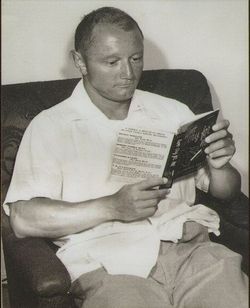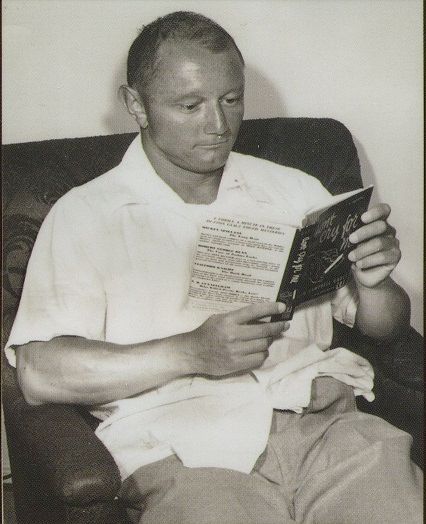“My grandfather can remember driving a herd of cattle down Los Angeles’ Main Street, which would be comparable to chasing a bunch of steers across 42nd and Broadway, New York City. My grandmother saw Denver in its wildest day, and I still spend many an hour listening to her hair-raising tales.
“I hope the fans won’t rebel against a city slicker writing their yarns, because to me that period of the country’s growth in which the Old West flourished is one of the most fascinating times in the world’s history, and I don’t think it will ever lose its appeal.”
The above quote from Les Savage, Jr. was found in "The Roundup," a column devoted to featured authors and their backgrounds - 1943.
Les Savage, Jr. was born in Alhambra, CA and grew up in Los Angeles. His first published story was "Bullets and Bullwhips" accepted by the prestigious magazine, Street & Smith's Western Story. Almost 90 more magazine stories followed, all set on American frontier, many of them published in Fiction House magazines, such as Frontier Stories and Lariat Story Magazine where Savage became a superstar with his name on many covers.
His first novel, TREASURES OF THE BRASADA, appeared from Simon & Schuster in 1947. Due to his preference for historical accuracy, Savage often ran into problems with book editors in the 1950's who were concerned about marriages between his protagonists and women of different races - a commonplace on the real frontier, but not in much Western fiction in that decade. However, as a result of the censorship imposed on many of his works, only now are they being fully restored by returning to the author's original manuscripts.
In the late 1940s Savage’s life underwent significant changes. He published his first novel, TREASURE OF THE BRASADA (Simon and Schuster, 1947), which remains one of his best set in the Texas border region he knew so well, and the next year on June 1, 1948 he married Marian Roberta Funck. Marian brought her young son, John, to this marriage whom Les called Butch, and he later adopted him. He dedicated LAND OF THE LAWLESS (Doubleday, 1951): “To Butch, My Son, and I could search the world and never find a better one.” All these years Les had been living with his parents at 6225 Winans Drive in Hollywood. A few months before their marriage the couple combined their savings and bought a house in Venice located at 225 Linnie Canal. Prior to spending their honeymoon at their new home, they had prepared a study in which Les could work in the attic where a 7’ x 9’ area was high enough to permit standing upright and accommodate his desk and files. With the addition now of flooring, a 3’ x 3’ skylight, electrical wiring, and a ship’s ladder straight up the bedroom wall, the room was complete. The family would have breakfast, after which John went to school, and Les climbed the ladder into his study. It was understood that unless invited up no one intruded while Les was at work, usually three or four hours, even five, in the mornings, and another hour in the evenings. At times on weekends as well Savage could be heard banging away on his typewriter. In the summer of 1951, the Savages moved to 1616 Ashland Avenue in Santa Monica. It would be the last time Les moved.
Savage was an excellent swimmer, and he worked out so that he was always in top physical condition, but a combination of his hereditary diabetes and elevated cholesterol brought on the heart attack to which he succumbed at St. John’s Hospital in Santa Monica on May 26, 1958, only a few days away from his tenth wedding anniversary.
Les Savage, Jr., left behind him ninety-odd magazine stories and twenty-four published novels as well as his last novel in manuscript. Much as Stephen Crane before him, as he wrote the shadow of his imminent death grew longer and longer across his young life, and he knew that, if he was going to do it at all, he would have to do it quickly. He did it well, better than almost anyone who wrote Western and frontier fiction, ever. Now that his novels and stories are being restored to what he had intended them to be, his achievement irradiated by his powerful and profoundly sensitive imagination will be with us always, as he had wanted it to be, as he had so rushed against time and mortality that it might be.
**Bio written by Jon Tuska and is used with permission from Golden West Literary Agency**
“My grandfather can remember driving a herd of cattle down Los Angeles’ Main Street, which would be comparable to chasing a bunch of steers across 42nd and Broadway, New York City. My grandmother saw Denver in its wildest day, and I still spend many an hour listening to her hair-raising tales.
“I hope the fans won’t rebel against a city slicker writing their yarns, because to me that period of the country’s growth in which the Old West flourished is one of the most fascinating times in the world’s history, and I don’t think it will ever lose its appeal.”
The above quote from Les Savage, Jr. was found in "The Roundup," a column devoted to featured authors and their backgrounds - 1943.
Les Savage, Jr. was born in Alhambra, CA and grew up in Los Angeles. His first published story was "Bullets and Bullwhips" accepted by the prestigious magazine, Street & Smith's Western Story. Almost 90 more magazine stories followed, all set on American frontier, many of them published in Fiction House magazines, such as Frontier Stories and Lariat Story Magazine where Savage became a superstar with his name on many covers.
His first novel, TREASURES OF THE BRASADA, appeared from Simon & Schuster in 1947. Due to his preference for historical accuracy, Savage often ran into problems with book editors in the 1950's who were concerned about marriages between his protagonists and women of different races - a commonplace on the real frontier, but not in much Western fiction in that decade. However, as a result of the censorship imposed on many of his works, only now are they being fully restored by returning to the author's original manuscripts.
In the late 1940s Savage’s life underwent significant changes. He published his first novel, TREASURE OF THE BRASADA (Simon and Schuster, 1947), which remains one of his best set in the Texas border region he knew so well, and the next year on June 1, 1948 he married Marian Roberta Funck. Marian brought her young son, John, to this marriage whom Les called Butch, and he later adopted him. He dedicated LAND OF THE LAWLESS (Doubleday, 1951): “To Butch, My Son, and I could search the world and never find a better one.” All these years Les had been living with his parents at 6225 Winans Drive in Hollywood. A few months before their marriage the couple combined their savings and bought a house in Venice located at 225 Linnie Canal. Prior to spending their honeymoon at their new home, they had prepared a study in which Les could work in the attic where a 7’ x 9’ area was high enough to permit standing upright and accommodate his desk and files. With the addition now of flooring, a 3’ x 3’ skylight, electrical wiring, and a ship’s ladder straight up the bedroom wall, the room was complete. The family would have breakfast, after which John went to school, and Les climbed the ladder into his study. It was understood that unless invited up no one intruded while Les was at work, usually three or four hours, even five, in the mornings, and another hour in the evenings. At times on weekends as well Savage could be heard banging away on his typewriter. In the summer of 1951, the Savages moved to 1616 Ashland Avenue in Santa Monica. It would be the last time Les moved.
Savage was an excellent swimmer, and he worked out so that he was always in top physical condition, but a combination of his hereditary diabetes and elevated cholesterol brought on the heart attack to which he succumbed at St. John’s Hospital in Santa Monica on May 26, 1958, only a few days away from his tenth wedding anniversary.
Les Savage, Jr., left behind him ninety-odd magazine stories and twenty-four published novels as well as his last novel in manuscript. Much as Stephen Crane before him, as he wrote the shadow of his imminent death grew longer and longer across his young life, and he knew that, if he was going to do it at all, he would have to do it quickly. He did it well, better than almost anyone who wrote Western and frontier fiction, ever. Now that his novels and stories are being restored to what he had intended them to be, his achievement irradiated by his powerful and profoundly sensitive imagination will be with us always, as he had wanted it to be, as he had so rushed against time and mortality that it might be.
**Bio written by Jon Tuska and is used with permission from Golden West Literary Agency**





